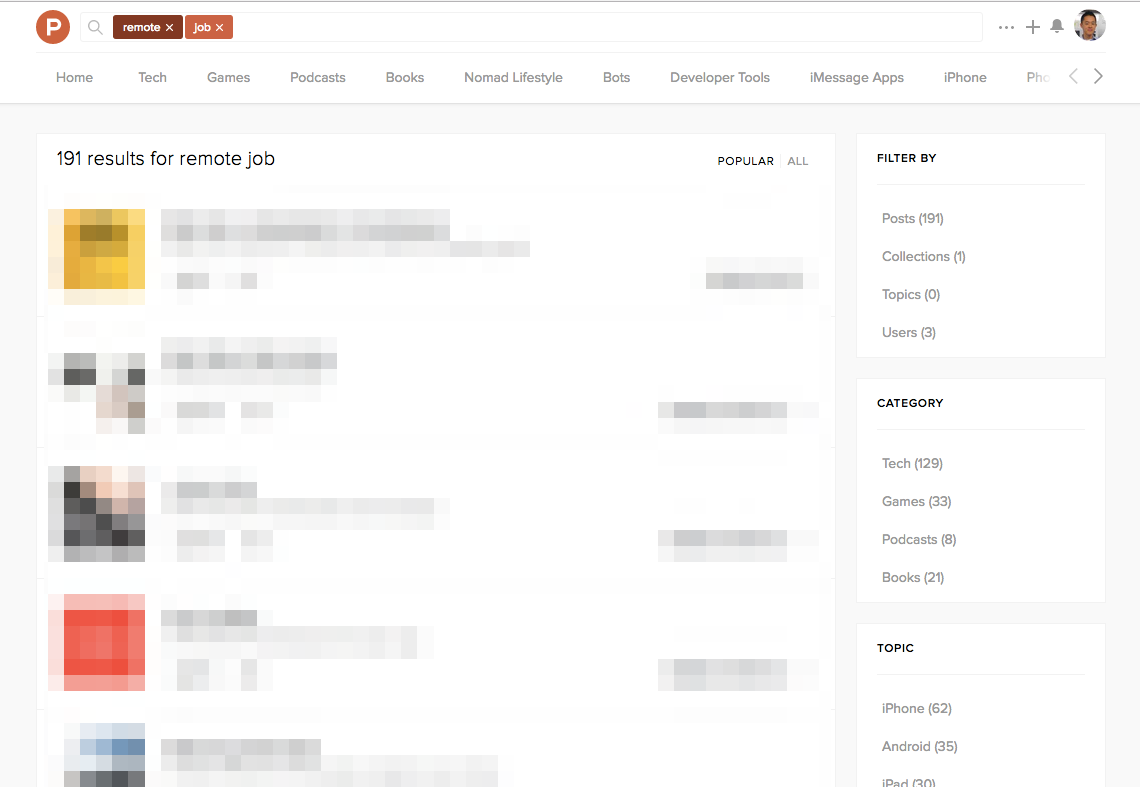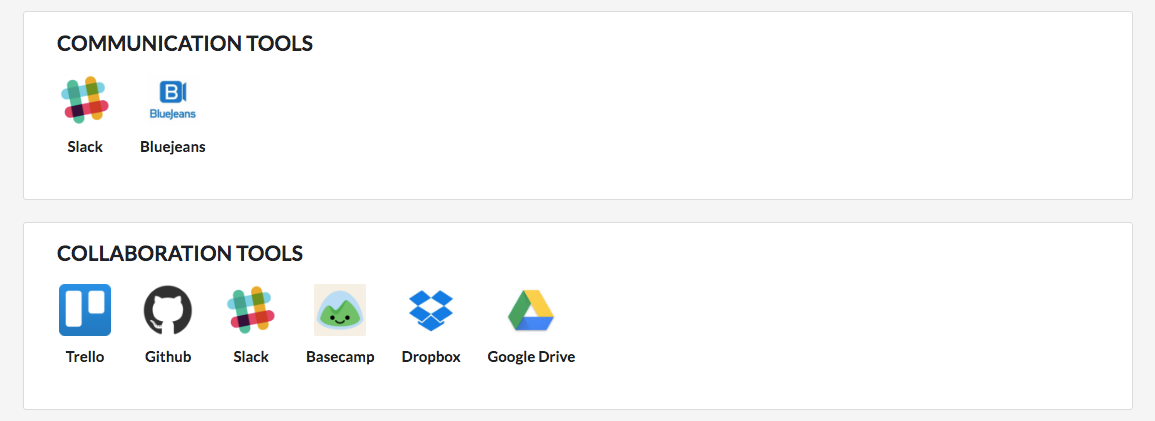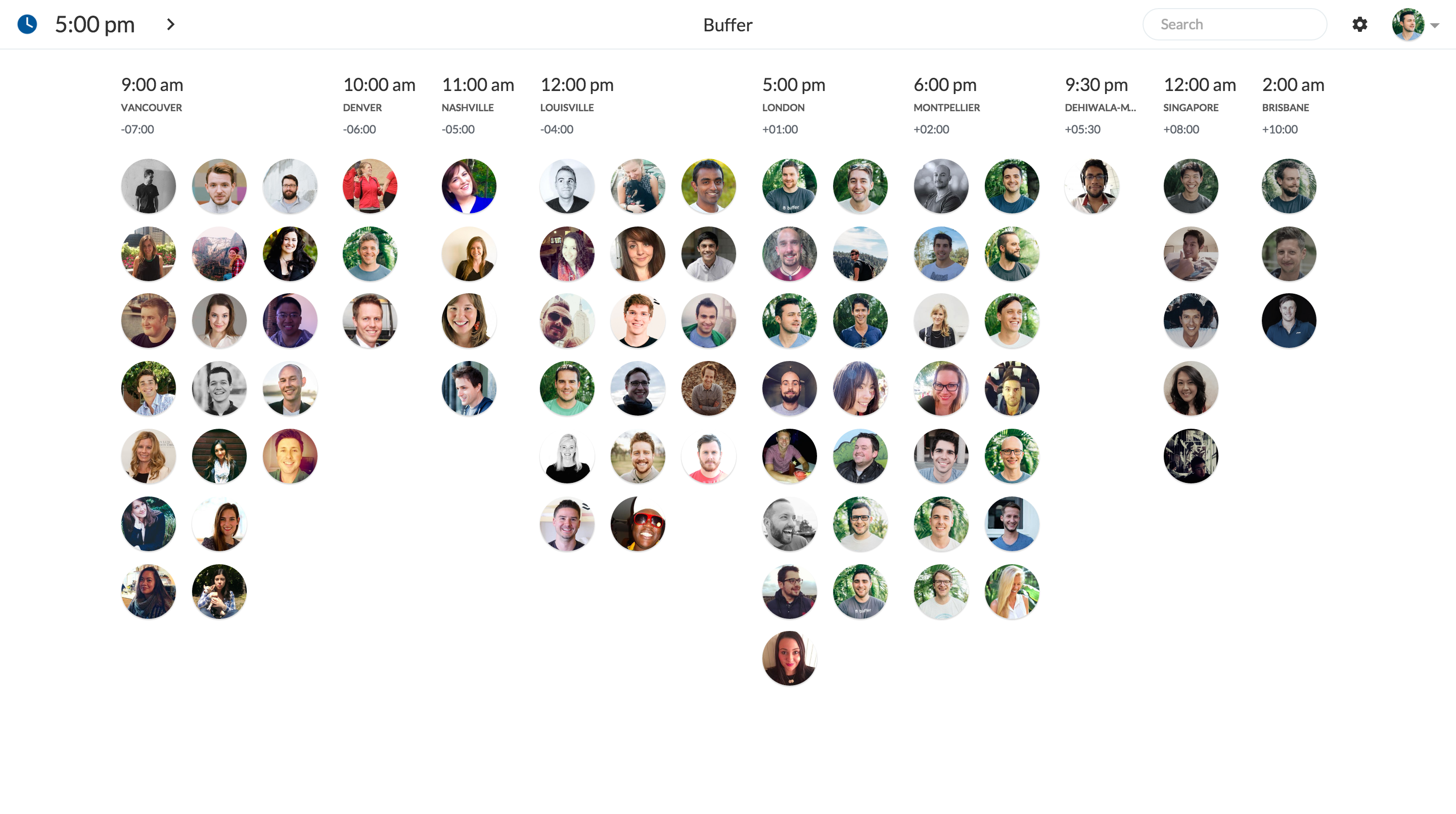We do not just get a remote job, but we join a remote team and its culture.
When we search for employees or search for remote work, we are often concerned only with our own, concrete, workplace and do not pay attention to the team associated with it. Such a shift in attention can not only lead to decisions based on inaccurate information, but also level the potential merits of remote work.
The rapid growth of bulletin boards for remote work seems to take an approach in which such vacancies and related jobs are considered to be something that can be taken at will, like an apple from a tree. With this approach, we are reduced to consumers of remote jobs, using these jobs after such occupations, which we think we might like.

Bulletin boards and aggregators offers for remote work quite a lot
However, such an immediately pleasing focus on the workplace is a mistake, since we ultimately assume to be participants in a remotely operating team, and not just executors of remote work. I think that we, by incomprehension, consider the characteristics of the workplace more important than the qualities of the team, sometimes ignoring the obvious and sometimes weakly manifested difficulties of remote work.
')
The presentation below examines these difficulties and makes it possible to understand why more attention should be paid to the team that is behind the remote work offered to you.
Communicating with colleagues when working remotely is not the same as in an office, go to the table of a colleague and start a conversation. Communication in a remotely working team is hampered by the fact that team members are not next to each other.
Because of the spaced apart environment, such a team is in a constant striving to achieve similarity of real human interactions between employees. How this is done can have a huge impact on work efficiency and on our personal ability to integrate into the organization.
The 470 companies registered on the RemoteBase website use more than 180 tools for internal communication and collaboration. Is it possible to be sure that you will fit well in some position, in a team, if you do not know what tools it uses to communicate?

Means used for communication by Litmus
Being far from each other, we can not just pat a colleague on the shoulder and talk. Instead, we choose some other option. Remotely operating teams have an ever-growing choice of communication and interaction tools, but not all of these tools can suit you.
Time zones further complicate cooperation, since team members may be located in different geographic areas. Despite the fact that everyone can work from 9 am to 5 pm in his usual workplace, the members of the remote teams are working at different times relative to each other.
Since it is unacceptable for workflows to be truly asynchronous in many jointly executed projects, working in several time zones may require some sort of compromise in your working hours. Often it is necessary to change your working hours to provide some overlap with other employees with whom you interact.

The result of the work of the site timezone.io, showing how Buffer employees are distributed over time zones
One of the advantages of remote work is the flexibility of the work schedule. It may turn out that you will not be able to fully take advantage of this advantage if you do not pay attention to the distribution of time zones among your future colleagues in a remote team.
Many groups that have employees working remotely are spatially distributed to varying degrees. Knowing the degree of distribution of a team can help you predict how you will feel when working remotely on such a team.
If you are one of the few remotely working employees in a large organization, then it is quite possible that you will feel detached from most of the team. In this case, will such a job give you a sense of satisfaction and help you achieve your career goals?
Currently, the RemoteBase service is trying to develop some practical estimates of categorizing companies as “fully remotely working personnel” , “mostly remotely working personnel” and “partially remotely working personnel” .
A company with fully remotely working personnel is considered fully distributed. A company that has mostly remotely working personnel is considered to be incompletely distributed, but at its core is networked. A company with partially remotely operating personnel has only a small number of remotely operating employees.
We all have our preferences and could be assigned to different categories, at different points in time - sometimes to different ones. Some feel great, being among the few remotely working employees in a large team. Others are more comfortable mostly or completely remote environment. The “detachment” of the team is important for applicants for remote work.
Being in a team of employees working remotely, you get the opportunity to get acquainted with their culture in the most nude. There is no lunch or fashionable office with table tennis available. Anything unreal is discarded.
An abstract view of a team and its culture is all that binds you together in a team of remotely working employees. Therefore, it is necessary to pay more attention to the team culture. Applicants for remote work should become more familiar with it, and employees should explain it in advance.
Despite the great importance of culture, it should be recognized that the RemoteBase site currently does not have enough information about the cultural aspects of companies. It is difficult to include the culture inherent in the company in the profiles of companies, because culture is not something that can be objectively measured or represented, described.
But, fortunately, we do not need to look very deeply to see the culture of some remote companies. For example, GitLab has a guide for an open source development team that shows internal workflows and their meaning. Hanno also has a publication, playfully titled Playbook and outlining how the team works.
As can be seen from the above, there are many features of remote work that, when looking for such work, make it all the more necessary to consider the team in the whole context, and not just individual jobs or vacancies. In the end, we do not just get remote employment. More precisely, we join a team whose employees work remotely.
Nevertheless, we, as a rule, do not consider everything related to the team and see only workplaces, being immersed in an environment in which numerous job boards constantly remind us of all the supposedly great jobs that we can perform from anywhere in the world.
I think that remote workplaces are not some standard “products”, and we are their ordinary consumers. The purpose of the RemoteBase site is to provide answers to the questions that are important for characterizing teams that are made up of long-distance employees, so that you can join the team that suits you best. And this instead of just getting some work that you think you like.
Surprisingly, such answers are rarely present in descriptions of remote jobs, despite their importance. I assume that there are no answers, not because they are of no interest to us, but because we did not ask the right questions.
But with the expansion of remote employment such questions appear. Then it is no longer enough for us to enjoy the joy of receiving distant work, and instead we begin to work out what is required to find a place of remote activity that will give a feeling of satisfaction and help you achieve your career goals.
I try to develop the approach that when looking for remote work the team deserves more attention than the remote workplace itself. This approach will help to better reveal the potential of remote work and - most importantly - ultimately make our lives happier.
The rapid growth of bulletin boards for remote work seems to take an approach in which such vacancies and related jobs are considered to be something that can be taken at will, like an apple from a tree. With this approach, we are reduced to consumers of remote jobs, using these jobs after such occupations, which we think we might like.

Bulletin boards and aggregators offers for remote work quite a lot
However, such an immediately pleasing focus on the workplace is a mistake, since we ultimately assume to be participants in a remotely operating team, and not just executors of remote work. I think that we, by incomprehension, consider the characteristics of the workplace more important than the qualities of the team, sometimes ignoring the obvious and sometimes weakly manifested difficulties of remote work.
')
The presentation below examines these difficulties and makes it possible to understand why more attention should be paid to the team that is behind the remote work offered to you.
Communication
Communicating with colleagues when working remotely is not the same as in an office, go to the table of a colleague and start a conversation. Communication in a remotely working team is hampered by the fact that team members are not next to each other.
Because of the spaced apart environment, such a team is in a constant striving to achieve similarity of real human interactions between employees. How this is done can have a huge impact on work efficiency and on our personal ability to integrate into the organization.
The 470 companies registered on the RemoteBase website use more than 180 tools for internal communication and collaboration. Is it possible to be sure that you will fit well in some position, in a team, if you do not know what tools it uses to communicate?

Means used for communication by Litmus
Being far from each other, we can not just pat a colleague on the shoulder and talk. Instead, we choose some other option. Remotely operating teams have an ever-growing choice of communication and interaction tools, but not all of these tools can suit you.
Time Zones
Time zones further complicate cooperation, since team members may be located in different geographic areas. Despite the fact that everyone can work from 9 am to 5 pm in his usual workplace, the members of the remote teams are working at different times relative to each other.
Since it is unacceptable for workflows to be truly asynchronous in many jointly executed projects, working in several time zones may require some sort of compromise in your working hours. Often it is necessary to change your working hours to provide some overlap with other employees with whom you interact.

The result of the work of the site timezone.io, showing how Buffer employees are distributed over time zones
One of the advantages of remote work is the flexibility of the work schedule. It may turn out that you will not be able to fully take advantage of this advantage if you do not pay attention to the distribution of time zones among your future colleagues in a remote team.
Detachment
Many groups that have employees working remotely are spatially distributed to varying degrees. Knowing the degree of distribution of a team can help you predict how you will feel when working remotely on such a team.
If you are one of the few remotely working employees in a large organization, then it is quite possible that you will feel detached from most of the team. In this case, will such a job give you a sense of satisfaction and help you achieve your career goals?
Currently, the RemoteBase service is trying to develop some practical estimates of categorizing companies as “fully remotely working personnel” , “mostly remotely working personnel” and “partially remotely working personnel” .
A company with fully remotely working personnel is considered fully distributed. A company that has mostly remotely working personnel is considered to be incompletely distributed, but at its core is networked. A company with partially remotely operating personnel has only a small number of remotely operating employees.
We all have our preferences and could be assigned to different categories, at different points in time - sometimes to different ones. Some feel great, being among the few remotely working employees in a large team. Others are more comfortable mostly or completely remote environment. The “detachment” of the team is important for applicants for remote work.
Culture
Being in a team of employees working remotely, you get the opportunity to get acquainted with their culture in the most nude. There is no lunch or fashionable office with table tennis available. Anything unreal is discarded.
An abstract view of a team and its culture is all that binds you together in a team of remotely working employees. Therefore, it is necessary to pay more attention to the team culture. Applicants for remote work should become more familiar with it, and employees should explain it in advance.
Despite the great importance of culture, it should be recognized that the RemoteBase site currently does not have enough information about the cultural aspects of companies. It is difficult to include the culture inherent in the company in the profiles of companies, because culture is not something that can be objectively measured or represented, described.
But, fortunately, we do not need to look very deeply to see the culture of some remote companies. For example, GitLab has a guide for an open source development team that shows internal workflows and their meaning. Hanno also has a publication, playfully titled Playbook and outlining how the team works.
Conclusion
As can be seen from the above, there are many features of remote work that, when looking for such work, make it all the more necessary to consider the team in the whole context, and not just individual jobs or vacancies. In the end, we do not just get remote employment. More precisely, we join a team whose employees work remotely.
Nevertheless, we, as a rule, do not consider everything related to the team and see only workplaces, being immersed in an environment in which numerous job boards constantly remind us of all the supposedly great jobs that we can perform from anywhere in the world.
I think that remote workplaces are not some standard “products”, and we are their ordinary consumers. The purpose of the RemoteBase site is to provide answers to the questions that are important for characterizing teams that are made up of long-distance employees, so that you can join the team that suits you best. And this instead of just getting some work that you think you like.
Surprisingly, such answers are rarely present in descriptions of remote jobs, despite their importance. I assume that there are no answers, not because they are of no interest to us, but because we did not ask the right questions.
But with the expansion of remote employment such questions appear. Then it is no longer enough for us to enjoy the joy of receiving distant work, and instead we begin to work out what is required to find a place of remote activity that will give a feeling of satisfaction and help you achieve your career goals.
I try to develop the approach that when looking for remote work the team deserves more attention than the remote workplace itself. This approach will help to better reveal the potential of remote work and - most importantly - ultimately make our lives happier.
Source: https://habr.com/ru/post/311466/
All Articles